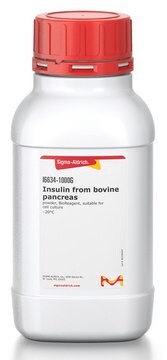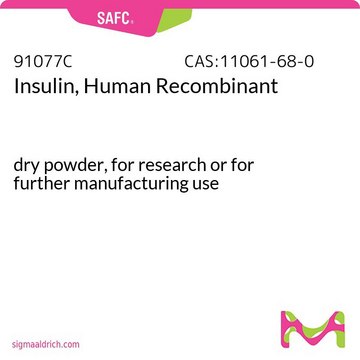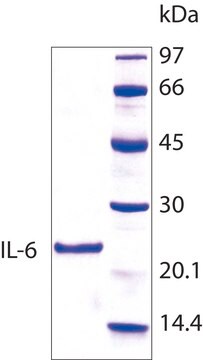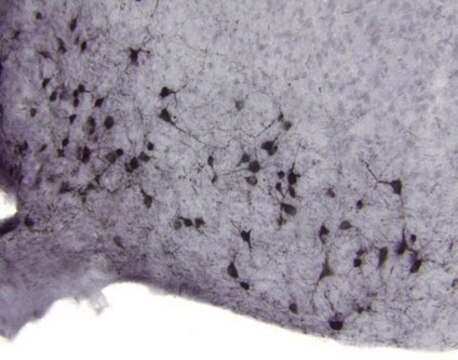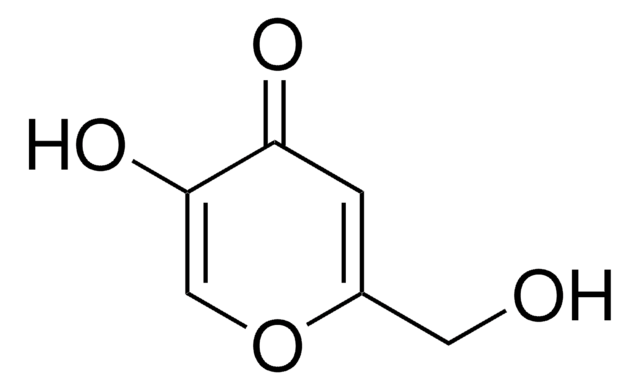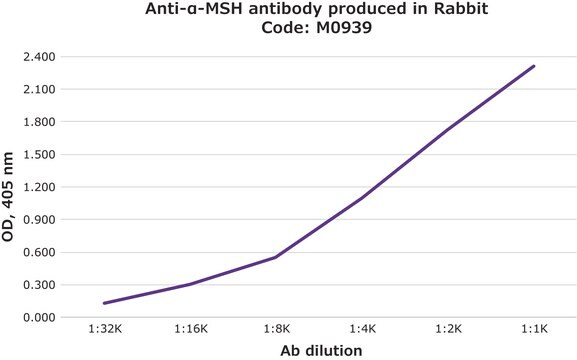M4135
α-Melanocyte stimulating hormone
≥97% (HPLC)
Sinonimo/i:
α-MSH, α-Melanotropin
About This Item
Prodotti consigliati
Origine biologica
synthetic (organic)
Livello qualitativo
Sterilità
non-sterile
Saggio
≥97% (HPLC)
Forma fisica
powder
Solubilità
water: 1.00-1.04 mg/mL, clear, colorless
N° accesso UniProt
Condizioni di spedizione
ambient
Temperatura di conservazione
−20°C
Stringa SMILE
CSCC[C@H](NC(=O)[C@H](CO)NC(=O)[C@H](Cc1ccc(O)cc1)NC(=O)[C@H](CO)NC(C)=O)C(=O)N[C@@H](CCC(O)=O)C(=O)N[C@@H](Cc2c[nH]cn2)C(=O)N[C@@H](Cc3ccccc3)C(=O)N[C@@H](CCCNC(N)=N)C(=O)N[C@@H](Cc4c[nH]c5ccccc45)C(=O)NCC(=O)N[C@@H](CCCCN)C(=O)N6CCC[C@H]6C(=O)N[C@@H](C(C)C)C(N)=O
InChI
1S/C77H109N21O19S/c1-42(2)64(65(79)106)97-75(116)61-20-13-30-98(61)76(117)54(18-10-11-28-78)88-62(103)38-85-66(107)57(34-46-36-84-50-17-9-8-16-49(46)50)94-67(108)51(19-12-29-83-77(80)81)89-70(111)55(32-44-14-6-5-7-15-44)92-72(113)58(35-47-37-82-41-86-47)95-68(109)52(25-26-63(104)105)90-69(110)53(27-31-118-4)91-74(115)60(40-100)96-71(112)56(33-45-21-23-48(102)24-22-45)93-73(114)59(39-99)87-43(3)101/h5-9,14-17,21-24,36-37,41-42,51-61,64,84,99-100,102H,10-13,18-20,25-35,38-40,78H2,1-4H3,(H2,79,106)(H,82,86)(H,85,107)(H,87,101)(H,88,103)(H,89,111)(H,90,110)(H,91,115)(H,92,113)(H,93,114)(H,94,108)(H,95,109)(H,96,112)(H,97,116)(H,104,105)(H4,80,81,83)/t51-,52-,53-,54-,55-,56-,57-,58-,59-,60-,61-,64-/m0/s1
WHNFPRLDDSXQCL-UAZQEYIDSA-N
Informazioni sul gene
human ... POMC(5443)
Cerchi prodotti simili? Visita Guida al confronto tra prodotti
Categorie correlate
Amino Acid Sequence
Descrizione generale
Applicazioni
- it has been Intracerebroventricularly (icv) injected to mice for behavioral studies.
- to determine the effect of α−MSH on growth of stationary Nb 2 node lymphoma cell cultures.
- to determine the effect of α−MSH on leptin secretion in the primary cultures of differentiated adipocytes.
- α−MSH promoted melanin production in the B16-F1 cells from murine melanoma cell line.
Azioni biochim/fisiol
Preadsorbimento dell’anticorpo
Linkage
Altre note
Codice della classe di stoccaggio
11 - Combustible Solids
Classe di pericolosità dell'acqua (WGK)
WGK 3
Punto d’infiammabilità (°F)
Not applicable
Punto d’infiammabilità (°C)
Not applicable
Dispositivi di protezione individuale
Eyeshields, Gloves, type N95 (US)
Certificati d'analisi (COA)
Cerca il Certificati d'analisi (COA) digitando il numero di lotto/batch corrispondente. I numeri di lotto o di batch sono stampati sull'etichetta dei prodotti dopo la parola ‘Lotto’ o ‘Batch’.
Possiedi già questo prodotto?
I documenti relativi ai prodotti acquistati recentemente sono disponibili nell’Archivio dei documenti.
I clienti hanno visto anche
Il team dei nostri ricercatori vanta grande esperienza in tutte le aree della ricerca quali Life Science, scienza dei materiali, sintesi chimica, cromatografia, discipline analitiche, ecc..
Contatta l'Assistenza Tecnica.

